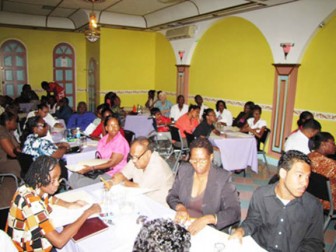-education consultation finds
The Ministry of Education’s Inclusive Education Consultation, which wrapped on Monday, has found that specialised training in a number of areas for teachers, parent and other care givers as critical to a proper school environment for special needs students.
A Government Information Agency (GINA) press release said the final meeting focused on schools in all regions except save for Four, Six and Ten-discussed at a previous session. While regions Four, Six and Ten have special needs schools, the other regions do not.
At the consultation, held at Regency Hotel on Monday, Chief Planning Officer Evelyn Hamilton outlined a number of issues identified at the previous sessions via a PowerPoint presentation. The issues highlighted included training, classroom, curriculum, and the physical condition of schools, matters relating to teachers and ministry officials as well as parental, medical and general issues. The meeting then focused on prioritising these matters and making recommendations

At a group session held after the presentation, members identified training for teachers, family members and care givers and medical professionals as necessary, particularly in the use of Braille, visual instruction and ICT. The meeting also said there was a need for therapists and social workers to be in the schools, both mainstream and special, to identify disabilities early so that education can be crafted to meet these challenges early. Other priority areas identified included the introduction of sign language as a subject in schools, the need for additional facilities and materials, intensive awareness campaigns, emoluments for special needs teachers, and abuse.
In her address, Minister of Education Priya Manickchand said the ministry is keen on hearing from all stakeholders, particularly those with disabilities and those that work with persons with disabilities, on how the education system can better cater for them. She noted that during the previous consultations, some small issues were brought up that can make big differences.
Manickchand explained that the points highlighted in the consultations would be compiled into a plan, before year-end, so that efforts in the New Year will be guided and supported by the budget. Importantly, the views gathered from the sessions guide the five-year plan.
Manickchand said these consultations are the first step the ministry is taking to include children with disabilities, as they comprised the group that had not yet fully been integrated into the system. The ministry has also held other consultations on issues such as abolition of corporal punishment and automatic promotion.





